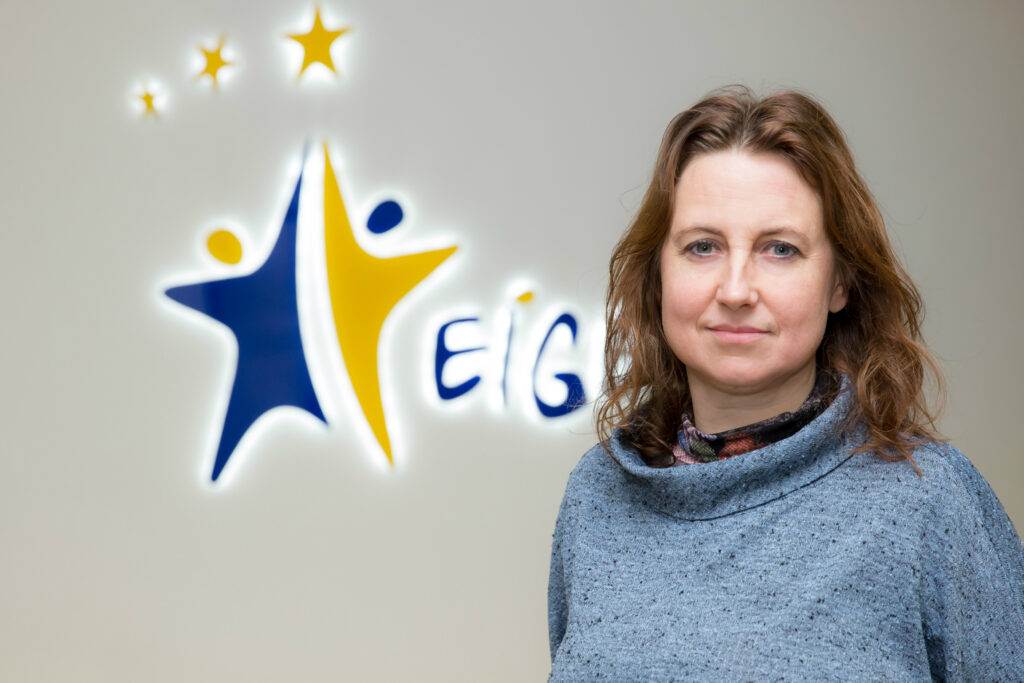In the context of International Women’s Day, it’s imperative to reflect on the challenges women face in accessing employment and balancing professional pursuits with childcare and family caregiving responsibilities. To delve deeper into these issues, we spoke with Jolanta Reingarde, Research & Statistics team leader at the European Institute for Gender Equality (EIGE), shedding light on the primary barriers for women and EIGE’s collaborative efforts with the European Union (EU) institutions to address these obstacles.

Question 1: Identifying Barriers for Women in Accessing Employment
EFFE: “What does EIGE identify as the primary barriers for women in accessing employment, and how does the institute collaborate with the European Union to address these obstacles?”
Jolanta Reingarde: “One of the primary barriers is the unequal share of unpaid care responsibilities, including childcare, long-term care, and housework. Our CARE survey revealed significant gender care gaps, with women bearing the brunt of intensive care responsibilities. This impacts their ability to participate in paid employment and career prospects. Additionally, access to care services pose challenges, as many women report unmet needs due to lack of services or non- affordable prices. Lack of adequate work-life balance measures further exacerbates gender inequalities in the care sector, forcing women to choose between caregiving duties and their careers, eventually leading to high care workforce dropout.”
Question 2: Promoting Balance Between Professional and Family Responsibilities
EFFE: “Childcare and family caregiving responsibilities often disproportionately affect women, impacting their professional pursuits. How does EIGE work with the European Commission to ensure policies and initiatives promote a balance between professional and family responsibilities, particularly for women?”
Jolanta Reingarde: “EIGE is a knowledge centre for gender equality, providing data and evidence for decision-making and raising awareness about gender disparities in society, including in care work. We collaborate closely with the European Commission and other organizations to address these challenges. Our initiatives include advocating for gender mainstreaming in policies and addressing gender-based violence – a major violation of women’s rights, which might prevent women from working We also highlight the links of care work with other policy areas, such as environmental sustainability and digital transition, to ensure that care is integrated into broader discussions and policy frameworks.”
The Green Transition: Empowering Women in Care Work
Jolanta Reingarde: “In the context of the green transition, it’s essential to recognize the critical role of women in care work and its intersection with environmental sustainability. Women are disproportionately affected by climate change and often play a central role in mitigating its effects through caregiving and household responsibilities. However, the care sector is often overlooked in discussions about green jobs and investments, despite being one of the lowest carbon sectors.”
EFFE: “How does EIGE advocate for the inclusion of the care sector in the green transition?”
Jolanta Reingarde: “EIGE emphasizes the importance of placing care at the heart of discussions about environmental sustainability (see e.g. Gender Equality Index 2023: Towards a green transition in transport and energy). We argue that investing in the care sector not only creates green jobs but also promotes social and environmental sustainability. By recognizing the link between care work and climate change, policymakers can develop policies that empower women in the care sector and contribute to a more sustainable future.”
The Digital Transition: Bridging the Gender Gap in Care Work
Jolanta Reingarde: “Similarly, the digital transition presents both opportunities and challenges for care work. While digital tools can improve efficiency and access to care services, they can also exacerbate gender inequalities if not implemented inclusively. Women in the care sector may face barriers in accessing and using digital technologies, further marginalizing them in the workforce. Therefore, it’s crucial to invest in digital literacy and skills training for care workers, ensuring that they can benefit from the digital transition without facing additional barriers.”
Question 3: Ensuring Decent Working Conditions in the Domestic & Home Care Sector
EFFE: “Working conditions in the domestic & home care sector can vary significantly. How can the European Union and Member States ensure that women working in this predominantly female sector have decent working conditions, including fair wages, reasonable working hours, and guarantees of workplace safety and health?”
Jolanta Reingarde: “Ensuring decent working conditions in the domestic & home care sector is crucial for gender equality. EIGE collaborates with the European Commission and Member States in collection of evidence and exchange of good practices in improving working conditions in the care sector. This includes advocating for fair wages, reasonable working hours, and guarantees of workplace safety and health. Additionally, we work to address the gender disparities in caregiving roles and promote policies that value and support caregiving work.”
As we commemorate International Women’s Rights Day, let us reaffirm our commitment to achieving gender equality in all aspects of life, including care work. Through collaborative efforts and policy reforms, we can create a more just and equal society for all.
[Article by EFFE, based on an interview with Jolanta Reingarde, Research & Statistics team leader at the European Institute for Gender Equality (EIGE).]
To delve deeper into the topic:
EIGE policy brief on bridging the gender care gap: A Better Work–Life Balance: Bridging the gender care gap | European Institute for Gender Equality (europa.eu)
And Gender Equality Index 2023, which covers the links between unpaid care and environmental sustainability: Gender Equality Index 2023: Towards a green transition in transport and energy | European Institute for Gender Equality (europa.eu)